Pakeezah, Meena Kumari's romantic Swan Song
Publié le 22 Juillet 2008
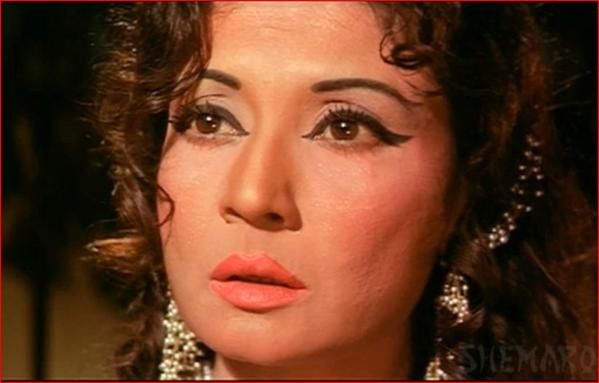 Of all the commentaries I have read about Kamal Amrohi’s 1972 movie Pakeezah, this one (Upperstall.com) corresponds most to what I thought of it :
Of all the commentaries I have read about Kamal Amrohi’s 1972 movie Pakeezah, this one (Upperstall.com) corresponds most to what I thought of it :
“Pakeezah is a stylized, larger than life mythicization of the familiar tale of the prostitute with the heart of gold (…)In the film Amrohi turns to the milieu and culture he is a product of - Uttar Pradesh's feudal elite, its life of ease and elegance, of romantic love, poetry and mujras. Its decadence is not without a touch of class and has sometimes resulted in much creative upsurge. Pakeezah inherits that legacy. There is grandeur in Amrohi's filmmaking - an epic magnitude of treatment. The evocative songs and the background music create the right period mood and Amrohi's eye for details brings great depth to the lavish sets. The dances are extremely well choreographed, cleverly hiding Meena Kumari's inability to dance (Just watch her walk and move ever so gracefully in the song Chalte Chalte even as two other nautch girls dance in the background). And the picturisation of the song Chalo Dildar Chalo across the wide expanse of sea and sky to the boat on which the lovers ride is romanticism at its best. In fact, the film's main merit in spite of its flaws, its at times disjointed flow, its stock situations and an over stretched plot, lies in its delirious romanticism. Though the suffering courtesan occupies central stage, she is defined by male values and shaped by patriarchal parameters with the courtesan having to lead a life of emotional repression. The caged bird whose feathers are trimmed and the torn kite hanging in her courtyard operate as visual symbols for her imprisonment and curtailment of desire. The train or the patriarchal haveli are well-knit constructs in the fabric of the film. In fact, the whistle of the train is used like a leitmotif throughout the film.
There are also occasional comments that suggest the opposite:
“This typically melodramatic Bollywood film has inexplicably become a favorite of Western critics. The script is ludicrous, the acting is over-the-top, and it looks cheesy. The only reasons for watching this soap opera are the wonderful songs sung by Mangeshkar and the curtain call of the legendary Meena Kumari. Watching the actress, who was ill during the filming and would drink herself to death at age 40 shortly after the film was released, has the same fascination as watching a train wreck. Her ex-husband, Amrohi, wrote and directed, but lacks the competency to execute either task well. Bollywood has produced far better films. » (kenjha at IMDb)

Well, being a Western critic myself, I’ll oblige: explain why this “inexplicably” pleasant film is so pleasant! Because one has to say it has flaws: they’re indicated in Upperstall.com’s review, and to this list, I would add Raaj Kumar’s rather clumsy acting, as if he felt trapped by a role he didn’t really believe in. But the rest of the crew performs well. Now, it’s evident for everyone that Meena Kumari is the pretext, and the centre of the film. But there are many other aspects.
Kamal Amrohi and Meena Kumari
Much of the film’s originality comes from its director, Kamal Amrohi (IMDb link). From what I’ve read, he’s in fact more a story-writer than a film director; he’s also known for being a poet in Urdu. His dialogue-writing skills are acclaimed; he took part in the writing of the great Mughal-E-Azam. Pakeezah, whose story was written by Amrohi, came out in 1972, but had been a project he had harboured since 1958! So great was his investment in the movie that he changed from B&W to colour, and then from that to Cinemascope when these technical improvements were introduced. Amrohi was Meena Kumari’s husband, and he broke his marriage to live with her and marry her in 1952. Their relationship must have been passionate and difficult, because they separated in 1964, and Meena Kumari had to obtain Amrohi’s promise of a divorce before she accepted to resume the shooting in 1968.
I mention all these events because I think they’re a good sign of the very personal dimension of the movie. That it took so long to make reveals the author’s profound commitment, but more than that, I’d say, his fixation with the life and the personality of Meena Kumari. Clearly the film is an attempt to recreate something out of what he lived with the actress. She is of course well known for having helped to introduce in Indian cinema the rebellious modern woman, in reaction to the traditional “pativrata nan” (or devoted wife – see this link), notably through Guru Dutt’s movie Sahib bibi aur ghulam (1962). But observers also realised the similarities between her character in the film and how she led her own love-life: fighting for a sexual recognition in a highly conventional and male-dominated society meant falling from the position that this society recognises to women.
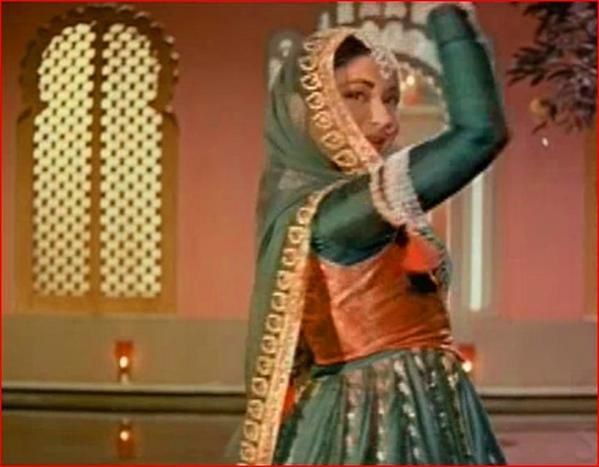
Pakeezah is an exploration of what it meant to be a “tawaif” (a dancer-singer courtesan) in the aristocratic milieus of traditional India. But Kamal Amrohi has turned his film into something more than just another high-flying prostitute film. We feel he has something to redeem that may be social on the surface, but is personal all the way down. There’s a secret to Pakeezah, it has to deal with the love-hate intimacy between Kumari and Amrohi. A lover, whose estranged wife has drifted away from him, is making her play the role of a beautiful prostitute, which he calls “pure” (meaning of pakeezah), and all this on the screen, which is like a voyeur’s dream. Isn’t that enough to justify certain idiosyncrasies, certain particularities, which a superficial spectator can easily calls flaws? And from a strict artistic point of view, he is right. But what is happening in Pakeezah is not only entertainment. I’m certain that some of the overdrawn scenes, their accumulation, the slow pace of some sections, are part of the director’s intimate (and somewhat perverted) enjoyment of his lost lover, whom he manipulates as director in ways which satisfies him and him alone. Why this pleasure has also become the audience’s we’ll examine later.
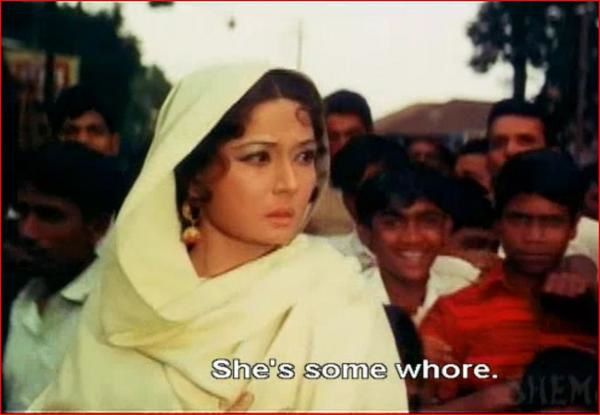
For example, what did Kamal Amrohi mean to do when he introduced those naïve coincidences in the film? From a narrative perspective, it’s not very satisfying to realise that Salim the mysterious lover turns out to be Sahibjaan’s cousin, and that she dances at his wedding where she meets with her lost father. There are also certain scenes with missing links or special photography, which create a strange impression, so much so that one wonders whether they shouldn’t be construed as dream sequences: it’s the case for the opening scene with Nargis, Sahibjaan’s mother, who is taken away in a carriage, and for the boat and elephant scene, and in fact a number of scenes possess this quality: the story emerges as half reality, half legend, what the author of the Upperstall review calls “larger than life mythicization”, and I believe this process is to be attributed to a vision, the vision of a passionate lover’s nostalgia of lost beauty and feelings, which nobody except perhaps she who is escaping from such an obsession (and yet submits to the magnification, the metamorphosis) can understand completely.
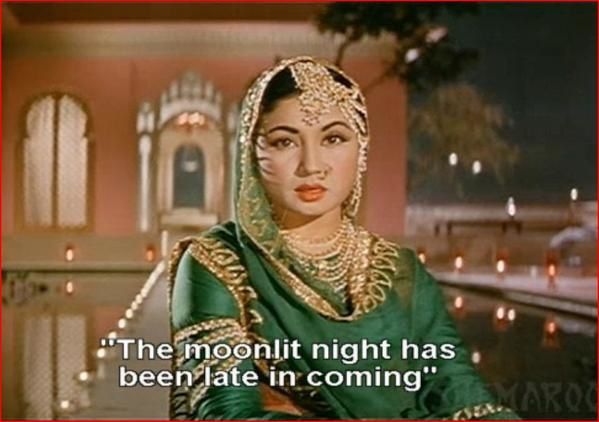 Purity and prostitution
Purity and prostitution
Choosing a prostitute as main character is a common choice, and not only in the Indian cinema. Directors (and the public at large) are clearly interested in the phenomenon of women selling their bodies’ charms, perhaps because there is a strong natural link between womanhood and virtue, between femininity and positive life values. The fact that Amrohi’s movie pits prostitution and chastity one against the other (and in spite of the “other pakeezah” story: sounds more like gossip than anything else) suggests naturally that the heroine remained pure or chaste of heart, even if her body has been defiled by all the encounters of brothel-life. And even if she’s tainted as far as in her blood, because her mother was also a “society girl”, as her grandfather called her. But having been brought up in the brothel from infancy, what else could she possibly be? How can victims be guilty?
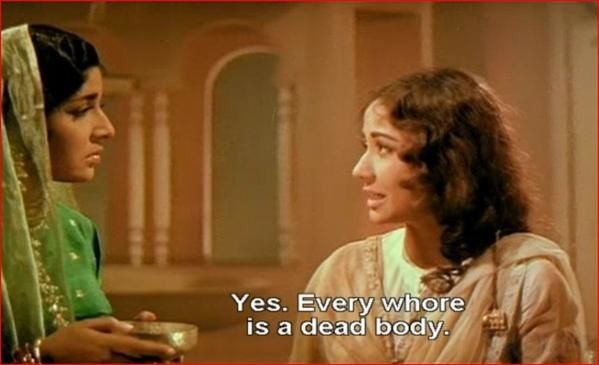
This seems rather straightforward. The problem is that we have this scene where Sahibjaan describes herself as a “dead body” – a dead body lying in a coffin, richly decorated of course to represent the palaces where she and her co-workers are laid (sorry for the pun, but it’s in the dialogue, and perhaps unintended): the rich and elegantly dressed nawabs who can afford them are thus compared to vultures feeding on rotting flesh: nothing really pure there! We therefore have the choice: consider that what Sahibjaan says indicates, precisely, that there is a chasm between herself and the life she leads, and so that she has remained pure down deep; or take her words for granted, and consider that her courtesan’s life has objectively defiled her, in spite of her abhorrence of it. I choose the second option, because I think it is more in keeping with what we have said concerning Meena Kumari. Kamal Amrohi would then be saying: in spite of all her faults, her drinking, her flirting, see, this woman was looking for a redemption, something absolute, a love which would cleanse her soul of all her sins. Like Meena Kumari Sahibjaan’s life has been objectively debasing; one could go as far as say that her conscience had accepted her sins as sins. So she isn’t pure nor chaste; she becomes it, through her love and Salim’s love, who is very much (I think) the director’s double. He’s telling us: this film will purify her, it will show her as I loved her, it will show the truth about her.
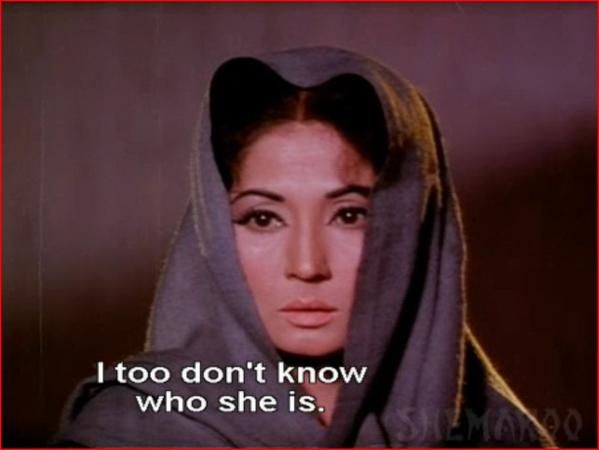 There is a theme which bolsters this theory, I think: it is Sahibjaan’s ignorance of her identity in the story. As she is taken away by Salim, she lets him believe she’s lost her memory. And so he introduces her to his family as an unknown girl who has been oppressed and doesn’t know who she is. And indeed, this invention is true: she has been a slave in the whore-house, and she can’t recognise her true self in the courtesan she has become. Then the grandma declares: “she appears to belong to a decent family”, which of course in the story is true too. So Salim is the one who loves her enough to accept her without her defiling past, and Amrohi is the one who transmutes Meena Kumari’s fallen persona into this romantic myth, one probably better suited to the role he wanted to play in her life, and spectators to remember.
There is a theme which bolsters this theory, I think: it is Sahibjaan’s ignorance of her identity in the story. As she is taken away by Salim, she lets him believe she’s lost her memory. And so he introduces her to his family as an unknown girl who has been oppressed and doesn’t know who she is. And indeed, this invention is true: she has been a slave in the whore-house, and she can’t recognise her true self in the courtesan she has become. Then the grandma declares: “she appears to belong to a decent family”, which of course in the story is true too. So Salim is the one who loves her enough to accept her without her defiling past, and Amrohi is the one who transmutes Meena Kumari’s fallen persona into this romantic myth, one probably better suited to the role he wanted to play in her life, and spectators to remember.
The dream of beauty
Lost beauty is always more beautiful for the romantic poet, who can reconstruct and embellish what has been lived and give it an appeal which reality didn’t have, or which he wasn’t able to enjoy when it was there. Hence the breakage, and hence the song. The film is undoubtedly a swan’s song, that dying melody of a wounded heart. Amrohi has wanted to retain the “thing of beauty” that was his lost lover, and has not been able to refrain from working on it to the point where the sublime becomes saturated and almost sickly. Here is what Derek Malcolm on guardian.co.uk has to say:
“If there is nothing special about the plot, the way it is accomplished is often astounding. Amrohi, who also wrote the script and some of the lyrics, saturates the screen not only with some amazing colour photography but with a swirling romanticism that somehow never tips over into the laughable.”
Yes, Amrohi’s art is not laughable, true, but certainly it must strike one as excessive, even if beautiful because excessive. The surfeit of lavish and stylised sets used in the film turns it into a sort of dream from the Arabian Nights: the palette of rich colours and luxury of baroque details is breathtaking and oppressive sometimes, but often accepted because precisely we feel we are plunged in myth or legend, and in such worlds, magic and delight are natural.
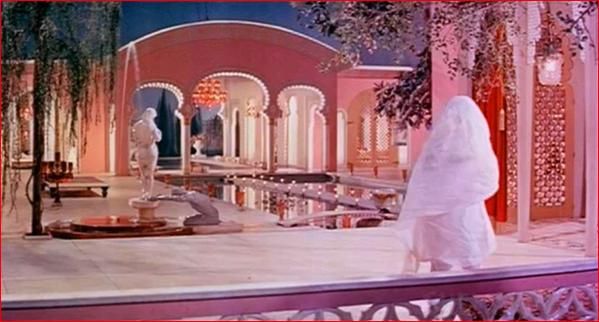 I won’t insist on the music and the songs, as they are so often and so rightly praised, but for me the whole film is a song, a dirge, even (Meena Kumari died one month after the movie was released, and she must have appeared very ill and close to death before that).
I won’t insist on the music and the songs, as they are so often and so rightly praised, but for me the whole film is a song, a dirge, even (Meena Kumari died one month after the movie was released, and she must have appeared very ill and close to death before that).
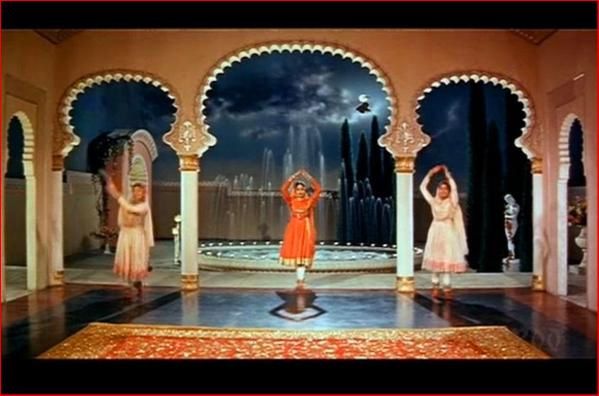
For all its artificiality, the film’s reconstruction process belongs to real art: that’s why we don’t laugh at it. That’s why we feel drawn towards it. There is a truth which belongs to reality, but there is another truth which is art’s truth. The artist’s right is to transmute reality into beauty, and to make us dream, even if this is escapist. For me, this operation has always been the special attraction of Bollywood. So much so that I wonder whether what I say of art, I may not say also of womanhood and love. Do not all men dream of this paradox, a chaste prostitute? Isn’t there a truth there too? Men dislike being deceived (knowingly), but they don’t necessarily mind deceiving, and taking advantage of a woman who gives herself to them completely, and I wonder whether they aren’t unconsciously more attracted by a woman who has known many men, than none. If this is the case, then it would contribute to explain Pakeezah’s charm: perhaps the film satisfies both women’s need for power and freedom, and men’s fascination for such power and freedom, provided what is happening to both possesses the purity of real love, and the eternity of beauty.
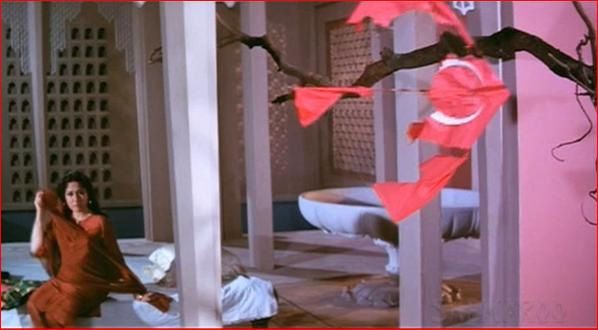
/image%2F1489169%2F20200220%2Fob_9722d6_banner-11.JPG)